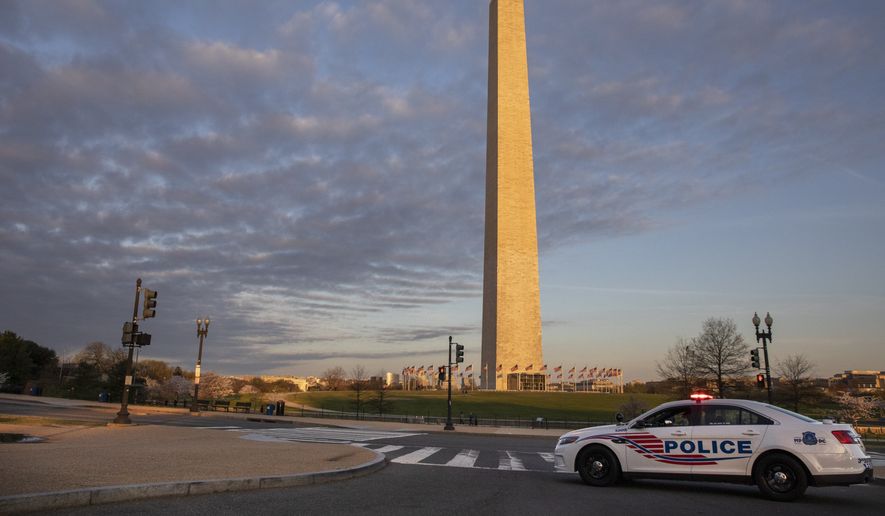The Metropolitan Police Department has relaunched its high school cadet program in a bid to encourage young people in the District of Columbia to join a force that has had trouble filling open positions.
The department has 3,525 officers, down from the 3,700-strong force in 2020 — the year that anti-police protests locally and across the country prompted a wave of resignations and retirements. D.C. leaders responded to the local “defund the police” movement by freezing recruiting efforts and cutting $15 million from the police budget.
In 2021, the nation’s 10th-largest police department, which typically trains more than 250 new officers each year, added 42 officers.
“There are fewer officers to respond to calls and conduct investigations, response time has increased, there are fewer detectives to close these cases and their caseloads have increased exponentially,” said Greggory Pemberton, president of the D.C. Police Union.
D.C. police investigated 226 homicides in 2021, the most in 17 years. Now, they are hoping to hire more officers by relaunching the Cadet Corps High School Program, which allows local seniors to work part time as uniformed, civilian employees for the police department while finishing their final year of school.
“Our recruiting efforts have been made through the use of social media, referrals from cadets who are currently in the program full time, and the engagement at the high schools in the area where cadets will host orientations at the schools with one of our MPD sergeants,” a department spokesperson told The Washington Times.
Orientation “has been the greatest resource into obtaining applicants” because it allows students to engage directly with cadets, the spokesperson said.
In a video on the department’s website, one cadet said she tells prospective participants that she likes the idea of a stable future and the program offers a path to take her there.
More than 80 high school students at least 17 years old are in the application process to begin the program this spring, a department spokesperson said.
If accepted, they will receive police training and mentoring from officers while working at the department 12 hours per week, making about $17 an hour.
“This part-time option will provide students with unique opportunities to develop their leadership skills, participate in physical training and learn about policing,” according to the program’s website.
Upon graduation, student cadets can become full-time cadets, earning about $35,000 a year. They can also receive up to 60 tuition-free credits toward police training at the University of the District of Columbia.
Police Chief Robert J. Contee III, who was sworn in last year, joined the High School Cadet Corps program in 1989 at age 17.
The program, he said, served as an outlet from the crime that plagued Carver Terrace, the neighborhood where he grew up.
“It changed my entire life,” Chief Contee said at his confirmation hearing last year. “It was these and other opportunities that helped shape the man I am today.”
Mayor Muriel Bowser, a Democrat, introduced legislation last fall to expand the cadet pool by removing a requirement that applicants attend a high school in the District.
During a news conference about the bill on Nov. 18, she said “the community has my commitment that we are going to throw every resource at violent crime until we flatten this curve too.”
National Police Association spokeswoman Betsy Brantner Smith told The Times that the group suggests “young, anti-police activists who believe the false narrative that American law enforcement officers are a danger to their communities apply for their local police agency or at the very least ride along with local patrol officer for a couple of shifts and see what the profession is all about.”
The retired police sergeant said the law enforcement profession “has an obligation to revamp and modernize the way we recruit new officers.”
The District is not alone. Short-staffed police departments across the country are also trying to ramp up recruitment efforts.
Phoenix is offering police recruits a $7,500 hiring bonus. Toledo, Ohio, is allowing officers from other in-state agencies to skip the six-month training academy normally required for lateral transfers. Baton Rouge, Louisiana, is launching a $50,000 marketing campaign to help encourage recruits.
Baton Rouge Police Chief Murphy Paul said during a city council meeting last week that the marketing effort will be the department’s first “very aggressive recruiting campaign.”
“You’re going to see us on social media platforms, you’re going to see us on billboards, you’re going to see some commercials,” Chief Paul said.
At least 110 of the city’s 698 allotted officer positions were vacant as of Jan. 1. The campaign’s goal is “to reach those numbers to keep up with attrition and resignations,” he said.
Sgt. Darren Ahmed said current officers’ engagement is a powerful tool for recruiting.
“When our officers are coming out, everybody from the newest officers to the most senior — our deputy chiefs, our chiefs, our uniformed patrol commanders — all those things play a benefit, and it lets the community see, ’Well, I want to do that job as well,’” Sgt. Ahmed said.
• Emily Zantow can be reached at ezantow@washingtontimes.com.




Please read our comment policy before commenting.